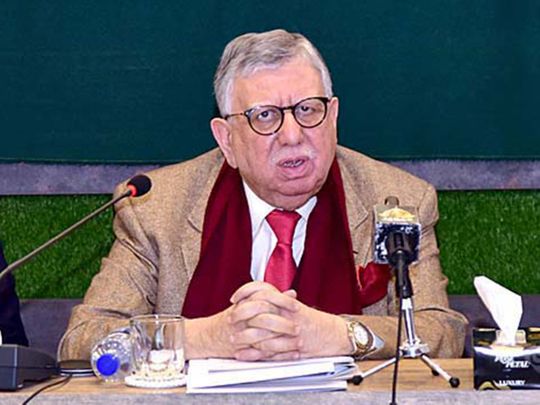
Islamabad: Many Pakistanis have expressed worries about serious inflation after the federal cabinet approved a supplementary budget that plans to end exemptions on sales tax to raise Rs343 billion.
The supplementary finance bill, known as the mini-budget, will end tax exemptions on nearly 150 items, introduce a uniform 17 per cent General Sales Tax (GST) on goods, levy new duties, to raise Rs 343billion ($1.92 billion) in revenue.
• 17% sales tax on mobile phones above $200
• 17%t tax on branded dairy products such as cream, butter and cheese.
• Increase tax on imported 1800cc electric vehicles to 12.5%
• Increasing the sales tax on 850cc - 1,000cc vehicles from 12.5 to 17%
• Fresh 17% taxes on imported solar panels.
• Taxes on crude oil exempted
The move was taken as part of measures required for the revival of $6 billion International Monetary Fund (IMF) programme. It is also crucial for Pakistan’s economy, which is struggling with current account deficits, depreciating currency and dwindling foreign reserves.
New taxes mostly on luxury imported items
Pakistan’s Finance Minister Shaukat Tarin said the apprehensions about inflation were unwarranted as around Rs 272 billion taxes were refundable or adjustable while the rest Rs 70 billion tax exemptions have largely been withdrawn from luxury items.
“We are not putting extra burden on poor as only Rs 2 billion tax exemptions have been proposed on the items used by the common man that would not cause inflation,” he said. Tarin said negotiated this against the IMF’s demand of removing 700 billion rupees of exemptions. Pakistan’s opposition members severely criticized the move and chanted anti-government slogans when the bill was presented in the National Assembly on Thursday. The parliament will debate and vote on the bill in the coming days.
Phones, computers and solar panels to be taxed
The bill proposes taxes on imported machinery, auto sector and also food items. The government proposed 17 per cent GST on mobile phones (valued above US$200), solar panels, poultry sector machines, imported raw materials for infant food, and pharmaceutical raw materials, 5 per cent GST on laptops and 12.5 per cent on electric vehicles. Most of these were earlier taxed from 0 to 14 per cent. Locally manufactured laptops and personal computers will remain exempted from tax.
Reaction
The bill proposed withdrawal of sales tax exemption for hybrid maize, sunflower, cotton amongst other seeds. “The 17 per cent sales tax on seeds will seriously affect Pakistani farmers already reeling from the rising cost of inputs and the supply chain disruptions,” Aamer Hayat Bhandara, Pakpattan-based young farmer, told Gulf News.
“The new taxes on maize seed will deter farmers from adopting quality seeds which will adversely impact crop yields.” Pakistan has remained a net importer of seeds.
Economists have warned about inflationary pressures in the coming days. “This bill is a bitter pill that needs to be swallowed as our economy is not in a shape to function without the IMF program temporarily,” said Asif Arsalan H. Soomro, an economic analyst and senior advisor to Swedish asset manager Tundra Fonder AB.
“The impact of higher taxes or end of exemptions would be inflationary for next couple of months but if the rupee stabilizes or appreciates marginally, this inflation can be brought under control.”
When asked was there another option for the government to improve the economic situation, he said: “The longer route would have been to expand the tax base and include services sector, reduce losses in power and other big sectors, increase penalties for non-filers, add fair taxes to real estate gains, agriculture gains and more duties on luxury imports other than food items. But that’s the long and tough path” that no government wants to take.












